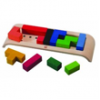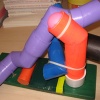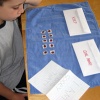Recent Research
| Question | Collaborating Lab |
Host Museum |
|
|---|---|---|---|
How does parental help change children's approach to problem solving?Parents and other adults often provide children with help while they are engaged in difficult tasks. However, little is known about what younger and older children do with that help (e.g. do they take the advice they are given by adults, or do they ignore it?). This study explored how young children solved a challenging puzzle when they work on it alone, and after they get help from a parent. |
 |
Harvard Graduate School of Education | Museum of Science (Boston, MA) |
How do object names affect children's expectations during play?This study asked: Do children explore more when the evidence they see conflicts with their assumptions about the physical properties suggested by an object's name? |
 |
MIT - Early Childhood Cognition Lab | Museum of Science (Boston, MA) |
Does imitating a teacher limit children’s exploration during play?It is no surprise that children learn quickly by watching others, but previous research had shown that children are also good at spontaneously generating their own evidence during play. This study asked: How do children’s desires to imitate a teacher affect their ability to learn on their own during play? |
 |
MIT - Early Childhood Cognition Lab | Museum of Science (Boston, MA) |
How do apologies affect children's feelings and behavior?Most parents want their children to learn to say “I’m sorry” – but many parents wonder what these words really mean to young children. This research considered whether children feel differently in the presence or absence of an apology, and whether children view prompted and spontaneous apologies differently. |
 |
Harvard Graduate School of Education | Museum of Science (Boston, MA) |
What do children understand about ownership?Children claim toys as soon as they can talk. Learning to share, and understanding when property can be given away, takes children a long time. This study examines how children (ages 2.5 to 5 years) learn the rules of ownership. |
 |
Boston University - Social Development & Learning Lab | Museum of Science (Boston, MA) |
Does it always feel good to get what you want?Researchers have been interested in how children make sense of emotions and desires in morally-charged situations. What happens when a person gets what they want, but does so by hurting someone else? What do young children expect this person too feel? Will they expect happiness, because a desire was satisfied, or will they expect sad/guilty feelings because a moral rule was broken and someone was hurt? |
 |
University of Michigan | Hand-On Museum (Ann Arbor, MI) |
Do children think that rewards and penalties should be distributed based on behavior?Research has shown that, when distributing resources such as rewards, even very young children are capable of considering concepts such as equality and deservingness. Additionally, young children have been shown to take into consideration concepts like motive and severity when distributing penalties. This study explores children’s reasoning about allocating both rewards (distributive justice) and penalties (retributive justice) and asks if children think similarly about these two forms of justice when making allocation decisions. It's possible, for example, that children might prefer to see rewards divided equally, but penalties distributed based on deservingness. |
 |
University of Michigan | Hand-On Museum (Ann Arbor, MI) |
How do children decide to distribute a limited resource?Both children and adults face choices about how to share limited resources. Previous research has shown that adults share more with people who have been more generous in the past, and also tend to give more to family members and individuals who belong to their social in-groups. We wanted to find out: Do children consider similar types of information when sharing things? |
 |
University of Wisconsin, Madison - Social Kids Lab | Madison Children's Museum (Madison, WI) |
Can children read body language to figure out who is in charge?Body language can reveal a lot about the nature of relationships between people. For example, if we see two people sitting very close together, we might guess that those people are friends or close relations. If we see one person with her chin up and another person with her chin down, we might guess that the first person is more powerful than the second person. |
 |
University of Wisconsin, Madison - Social Kids Lab | Madison Children's Museum (Madison, WI) |
Can children perform intuitive algebra?Previous research had shown that children - and even infants - think about numbers long before entering school. For example, preschoolers know that when they see five objects, then see five more added (5 + 5), the outcome is more likely to be 10 than 6. This study investigated intuitive math abilities - in particular, whether young children can use their intuitive sense of number to figure out an unknown quantity, a skill that is the basis of algebra. |
 |
Johns Hopkins University - Laboratory for Chid Development | Maryland Science Center (Baltimore, MD) |
| Question | Collaborating Lab |
Host Museum |
|
|---|---|---|---|
How do children learn to share?It is widely believed that children are selfish and have difficulty learning how to share and be fair, but we were curious whether this is always true. In this study, we look at children’s willingness to share with a child they have never met, in order to find out more about how children learn to be generous. |
 |
Boston University - Social Development & Learning Lab | Museum of Science (Boston, MA) |
Current Research Projects - Museum of Science, BostonCheck out all on-going research projects in Living Laboratory at the Museum of Science, Boston. |
Museum of Science (Boston, MA) |